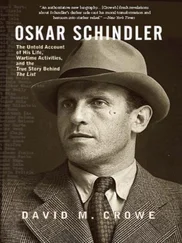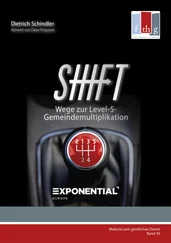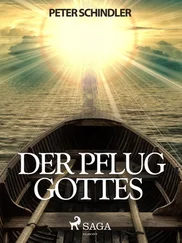Neither Herr Schindler nor the driver glanced up at the ramparts as the car turned southeast toward the river. At the Podgórze Bridge, the guards, placed above the freezing Vistula to prevent the transit of partisans and other curfew-breakers between Podgórze and Cracow, were used to the vehicle, to Herr Schindler’s face, to the Passierschein presented by the chauffeur. Herr Schindler passed this checkpoint frequently, traveling either from his factory (where he also had an apartment) to the city on business, or else from his Straszewskiego Street apartment to his plant in the suburb of Zablocie. They were used to seeing him after dark too, attired formally or semiformally, passing one way or another to a dinner, a party, a bedroom; perhaps, as was the case tonight, on his way ten kilometers out of town to the forced-labor camp at Płaszów, to dine there with SS Hauptsturmführer Amon Goeth, that highly placed sensualist. Herr Schindler had a reputation for being generous with gifts of liquor at Christmas, and so the car was permitted to pass over into the suburb of Podgórze without much delay.
It is certain that by this stage of his history, in spite of his liking for good food and wine, Herr Schindler approached tonight’s dinner at Commandant Goeth’s more with loathing than with anticipation. There had in fact never been a time when to sit and drink with Amon had not been a repellent business. Yet the revulsion Herr Schindler felt was of a piquant kind, an ancient, exultant sense of abomination—of the same sort as, in a medieval painting, the just show for the damned. An emotion, that is, which stung Oskar rather than unmanned him. In the black leather interior of the Adler as it raced along the trolley tracks in what had been until recently the Jewish ghetto, Herr Schindler—as always—chain-smoked. But it was composed chain smoking. There was never tension in the hands; he was stylish. His manner implied that he knew where the next cigarette was coming from and the next bottle of cognac. Only he could have told us whether he had to succor himself from a flask as he passed by the mute, black village of Prokocim and saw, on the line to Lwów, a string of stalled cattle cars, which might hold infantry or prisoners or even—though the odds were against it—cattle.
Out in the countryside, perhaps ten kilometers from the center of town, the Adler turned right at a street named—by an irony—Jerozolimska. This night of sharp frosty outlines, Herr Schindler saw beneath the hill first a ruined synagogue, and then the bare shapes of what passed these days as the city of Jerusalem, Forced Labor Camp Płaszów, barracks town of 20,000 unquiet Jews. The Ukrainian and Waffen SS men at the gate greeted Herr Schindler courteously, for he was known at least as well here as on the Podgórze Bridge.
When level with the Administration Building, the Adler moved onto a prison road paved with Jewish gravestones. The campsite had been till two years before a Jewish cemetery.
Commandant Goeth, who claimed to be a poet, had used in the construction of his camp whatever metaphors were to hand. This metaphor of shattered gravestones ran the length of the camp, splitting it in two, but did not extend eastward to the villa occupied by Commandant Goeth himself. On the right, past the guard barracks, stood a former Jewish mortuary building. It seemed to declare that here all death was natural and by attrition, that all the dead were laid out. In fact the place was now used as the Commandant’s stables. Though Herr Schindler was used to the sight, it is possible that he still reacted with a small ironic cough. Admittedly, if you reacted to every little irony of the new Europe, you took it into you, it became part of your baggage. But Herr Schindler possessed an immense capacity for carrying that sort of luggage.
A prisoner named Poldek Pfefferberg was also on his way to the Commandant’s villa that evening. Lisiek, the Commandant’s nineteen-year-old orderly, had come to Pfefferberg’s barracks with passes signed by an SS NCO. The boy’s problem was that the Commandant’s bathtub had a stubborn ring around it, and Lisiek feared that he would be beaten for it when Commandant Goeth came to take his morning bath. Pfefferberg, who had been Lisiek’s teacher in high school in Podgórze, worked in the camp garage and had access to solvents. So in company with Lisiek he went to the garage and picked up a stick with a swab on the end and a can of cleaning fluid. To approach the Commandant’s villa was always a dubious business, but involved the chance that you would be given food by Helen Hirsch, Goeth’s mistreated Jewish maid, a generous girl who had also been a student of Pfefferberg’s.
When Herr Schindler’s Adler was still 100 meters from the villa, it set the dogs barking—the Great Dane, the wolfhound and all the others Amon kept in the kennels beyond the house. The villa itself was square-built, with an attic. The upper windows gave onto a balcony. All around the walls was a terraced patio with a balustrade. Amon Goeth liked sitting out of doors in the summer. Since he’d come to Płaszów, he’d put on weight. Next summer he’d make a fat sun-worshiper. But in this particular version of Jerusalem, he’d be safe from mockery.
An SS Unterscharführer (sergeant) in white gloves had been put on the door tonight. Saluting, he admitted Herr Schindler to the house. In the hallway, the Ukrainian orderly Ivan took Herr Schindler’s coat and homburg. Schindler patted the breast pocket of his suit to be sure he had the gift for his host: a gold-plated cigarette case, black-market. Amon was doing so well on the side, especially with confiscated jewelry, that he would be offended by anything less than gold plate.
At the double doors opening onto the dining room, the Rosner brothers were playing, Henry on violin, Leo on accordion. At Goeth’s demand, they had put aside the tattered clothing of the camp paint shop where they worked in the daytime and adopted the evening clothes they kept in their barracks for such events. Oskar Schindler knew that although the Commandant admired their music, the Rosners never played at ease in the villa. They had seen too much of Amon. They knew he was erratic and given to ex tempore executions. They played studiously and hoped that their music would not suddenly, inexplicably, give offense.
At Goeth’s table that night there would be seven men. Apart from Schindler himself and the host, the guests included Julian Scherner, head of the SS for the Cracow region, and Rolf Czurda, chief of the Cracow branch of the SD, the late Heydrich’s Security Service.
Scherner was an Oberführer—an SS rank between colonel and brigadier general, for which there is no army equivalent; Czurda, an Obersturmbannführer, equivalent to lieutenant colonel. Goeth himself held the rank of Hauptsturmführer, or captain. Scherner and Czurda were the guests of highest honor, for this camp was under their authority. They were years older than Commandant Goeth, and SS police chief Scherner looked definitely middle-aged with his glasses and bald head and slight obesity. Even so, in view of his protégé’s profligate living habits, the age difference between himself and Amon didn’t seem so great.
The oldest of the company was Herr Franz Bosch, a veteran of the first war, manager of various workshops, legal and illegal, inside Płaszów. He was also an “economic adviser” to Julian Scherner and had business interests in the city.
Oskar despised Bosch and the two police chiefs, Scherner and Czurda. Their cooperation, however, was essential to the existence of his own peculiar plant in Zablocie, and so he regularly sent them gifts. The only guests with whom Oskar shared any fellow feeling were Julius Madritsch, owner of the Madritsch uniform factory inside this camp of Płaszów, and Madritsch’s manager, Raimund Titsch. Madritsch was a year or so younger than Oskar and Herr Commandant Goeth.
Читать дальше












